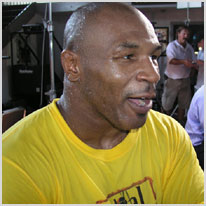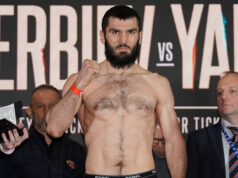By Norm Frauenheim

The birthday was a long shot. Few guessed it would ever happen. Mike Tyson is 50. Buster Douglas probably faced smaller odds when, as a 42-to-1 underdog, he beat Tyson more than a quarter of a century ago.
Tyson’s milestone, instead of an early headstone, came and went Thursday amid some headlines, but none of the deafening craziness that defined him for so long.
That’s an upset. Tyson’s biggest victory, too.
In doing a cover story on Tyson for The Ring in 2014, he told me: “Let’s be men about this. Be honest. You didn’t think we’d be talking to each other like we are right now. Did you? Come on now, be real. You thought I’d be dead, right? Hey, I thought I’d be dead.’’
Tyson survived — survived prison, drugs, booze, outrage from the infamous bite he took out of Evander Holyfield’s ear and all the rest – because he learned how to deal with the personal demons, who once outnumbered the crowd in his entourage. How did he do it? He grew up.
It sounds simple enough. But it wasn’t, especially for a kid from the streets of Brooklyn’s Brownsville neighborhood who won the world heavyweight title faster than anyone in the fabled division’s history. He was 20, which is another way of saying he just wasn’t ready for worldwide attention and unprecedented money.
“There ain’t no future in my past,’’ he told me in 2014.
He began to figure to figure that out after the past landed him at rock bottom. He was virtually finished as a fighter when he arrived in Phoenix in the fall of 1998, searching for a way to resurrect his career after the infamous Bite Fight disqualification at Las Vegas’ MGM Grand in 1997. He was in Arizona for counseling and to train at an old gym that the city was about to demolish.
Central Boxing was scheduled for the wrecking ball when Tyson decided he wanted to train there in beat-up building without air-conditioning. There’s AC there, now. But Tyson liked it for the hot box it was. Within its old walls, temps could hit 130 degrees during summer days in the Arizona desert.
Tyson saved the gym. It’s still there, near the state capitol and with AC. But nothing could save his career, which Holyfield effectively ended by stripping him of the intimidation that defeated so many frightened opponents before opening bell. After moving to Phoenix, he fought 10 times, winning five, losing three and getting no-contest in two. But he scared no one any more, other than himself.
It was that period in Tyson’s life when he used talk, often ad nauseam, about what a waste it had been. Again and again, he said he was sick and tired of boxing. He knew he didn’t want to be in the ring anymore, but he was because of a tax bill and other financial responsibilities.
When I first met him as a reporter for The Arizona Republic newspaper, I was cautious, fearful perhaps that he’d go off on a rant and take a piece of my ear. I’d stop at Central and he’d look through me as if he had never seen me. Then, there were times he welcomed me like an old boyhood friend. He just wanted to talk and he would, almost non-stop.
After one workout, I told him I had to leave. He followed me out into the mid-summer heat and to my truck. I opened the door and Tyson dropped his heavy right hand on my left elbow. I felt a hint of the power that frightened the heavyweight division for so long.
With one quick yank, he could have pulled my arm right out of its shoulder socket. I froze. Tyson talked. I listened.
It was then I realized Tyson was mostly afraid of himself, especially when he knew he was finished as a fighter. What was next for somebody who knew nothing else? He talked then, and continued to talk for another couple of years, as though he was trying to exorcise the demons. I was skeptical that he ever could. But he did, confronting tragedy when a 4-year-old daughter, Exodus, died in an accident on treadmill in Phoenix in 2009.
The tragedy helped forge the man. He would be back in Phoenix to visit ailing Muhammad Ali before Ali’s death on June 3. A week later, Tyson was a pallbearer for Ali’s funeral in Louisville.
Tyson was there to honor Ali. It was a sad moment, a reason to grieve, yet also fitting in terms of a heavyweight history full of champions, each different and yet each linked by what they did and how they did it.
Happy Birthday, champ.








